Archive: Community-Based Family Planning Toolkit
Archive:
Community-Based Family Planning Toolkit
You have reached this page either from the main Toolkits Archive page or because you followed a link to a page or resource that used to be in a K4Health Toolkit. The Toolkits platform has been retired.

The Community-Based Family Planning Toolkit collected and shared reliable and relevant information about community-based family planning (CBFP) programs and for strengthening the capacity of agencies and organizations to plan, implement, evaluate, promote, and scale up CBFP programs. Contributors to the original version of the Toolkit included ICF International and Wellshare International.
Toolkit Alternatives
- Visit community-based family planning pages at Advancing Partners and Communities and FHI 360
- View/download “Who Provides Family Planning?” (Chapter 26 of Family Planning: A Global Handbook for Providers)
- View/download the High Impact Practices briefs on Community Health Workers and Social Norms, and view the webinar series “Social Norms: Promoting community support for family planning“
- Visit this FP insight collection on community-based family planning
- Visit past captures of the Community-Based Family Planning Toolkit on the Internet Archive’s Wayback Machine
If you urgently require a specific resource from a retired Toolkit, contact toolkits-archive@knowledgesuccess.org.





